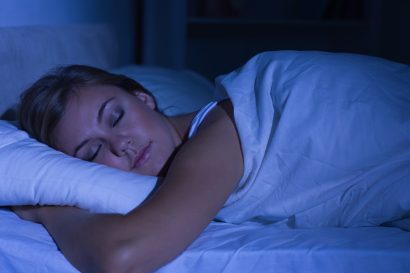Is Your Sleeping Position Contributing to Your Dry Eye Problem?
Written by Dr. David Evans Last modified on April 22, 2019
Dry eye is one of the most common eye problems that people deal with on an everyday basis. Symptoms can include things like burning, itching or stinging, eye fatigue and redness, light sensitivity, blurred vision and more. Depending on the severity, it can be more than a minor nuisance. It can be downright debilitating.
There are a number of known causes of dry eye, including vitamin imbalance, sun overexposure, pregnancy, allergies, drug side effects, environmental factors, LASIK surgery… but there might be a new cause to add to that list. Your sleep position.
At the ASCRS meeting earlier this year in my old stomping ground of New Orleans, David Alevi, MD of Ophthalmic Consultants of Long Island introduced some interesting research he and his team have been conducting that evaluates the potential link between dry eye and side sleeping. The study evolved from Dr. Alevi noticing that many of his dry eye patients, who sleep on their sides, complained of worse symptoms in the morning.

The study involved 125 patients who had dry eye or meibomian gland dysfunction (a condition linked as a cause of dry eye syndrome with similar symptoms) who sleep on their sides. Participants completed the Ocular Surface Disease Index (OSDI) questionnaire which helps identify how serious they view their condition. Not too dissimilar from the basic pain threshold question that you may get asked by your doctor, but obviously far more detailed. A variety of tests were also conducted to grade dry eye severity from patient to patient to use as a baseline. Dr. Alevi and his team then asked participants to change their sleeping style, laying on their back instead of sleeping on their side. (Not as easy as you might think.) Dr. Alevi and his team found that dry eye symptoms improved in participants who slept on their back rather than their side.
Why would sleeping on your side cause your dry eye symptoms to be worse? Dr. Alevi’s research doesn’t offer a definitive reason, but it could be related to improper tear drainage. Although the results are not conclusive, the correlation between how you sleep and the severity of your dry eye symptoms seems to warrant further study.
So what does all this mean?
If you are a side sleeping dry eye sufferer who finds that your symptoms are often worse in the morning, try making the adjustment to sleep on your back and see if you notice an improvement. But keep in mind that Dr. Alevi’s results reflect a relatively small study and that there is no suggestion of this resolving the underlying cause(s) of dry eye.
To learn more about dry eye and to read about dry eye treatments, check out our comprehensive article: https://www.bettervisionguide.com/dry-eye-syndrome/
Read more about Dr. Alevi’s study here.
